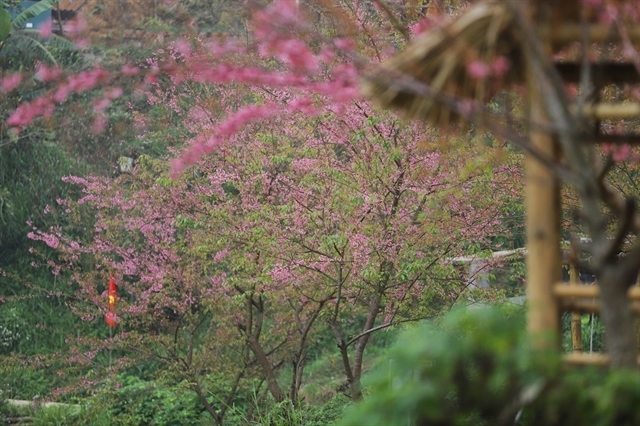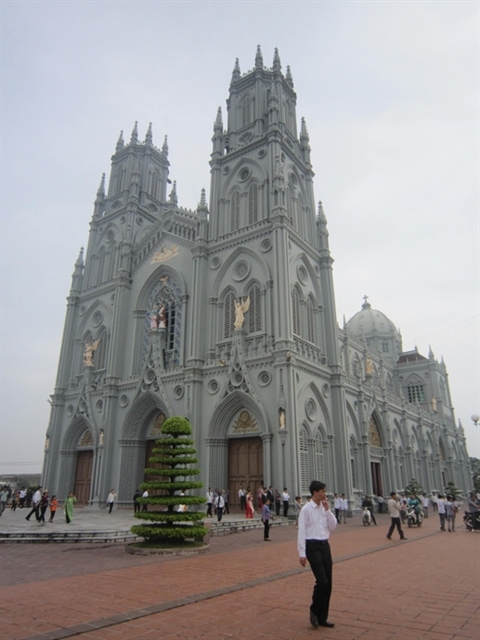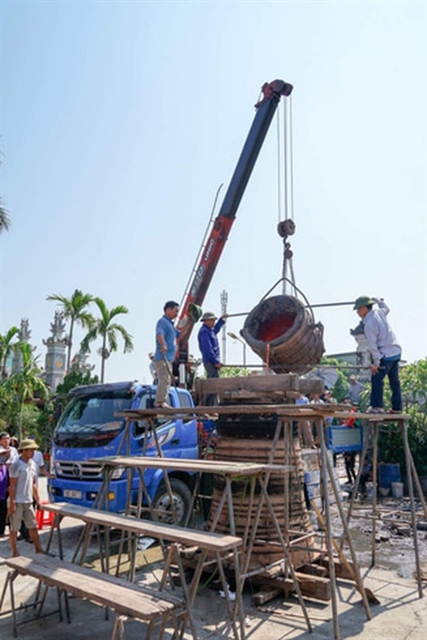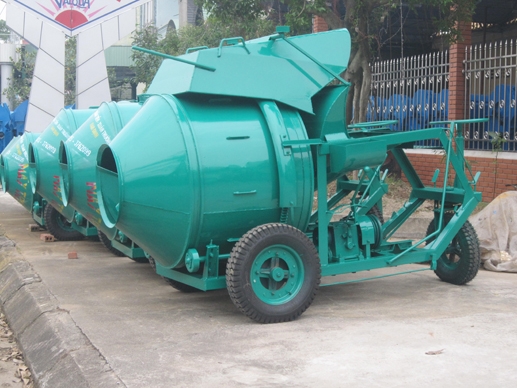 Features
Features

The ancient Catholic village of Kiên Lao in Nam Định Province is well known for its bronze casting. Nowadays, it also produces machinery for construction projects across the country.
By Hà Nguyễn & Hoàng Hồ
The ancient Catholic village of Kiên Lao in Nam Định Province is well known for its bronze casting.
Nowadays, it also produces machinery for construction projects across the country.
Mai Văn Tân, chairman of Xuân Tiến Village (as it is now known), says: “Bell casting has been around for more than 200 years, and there is still room to develop.”

|
| Kiên Lao Church, which was built in 1533, is one of the most beautiful catholic churches in Nam Định Province. Photo nhathoconggiao.com |
Village elder Lê Văn Hào says the craft was founded by Lê Văn Nghiêm, who took the art of casting the famous Đông Sơn bronze drums in Thanh Hóa to Kiên Lao.
The last six generations of the Lê Văn clan have continued his work and provided stable jobs for local people.
From the youngest generation, Lê Văn Kha says his workshop produces bells and statues weighing from 0.5-7 tonnes.
“I was born into a bronze casting family, so I know how to fire up the furnace and combine the right ratio of bronze and tin, as well as designing patterns on items such as bells,” Kha says.

|
| Bell casting has existed in the village for more than 200 years. Photo anninhthudo.vn |
To make a bronze bell, a worker first has to make a mould from clay mixed with rice husks. The mould is then fired to harden it, and while it cools workers design patterns inside before firing it again, he says.
The most important part of the process is the bronze casting itself. Only skilled workers know when the molten metal is ready to pour it in the mould, Kha says.
“We have to work carefully through each stage to ensure quality,” he says.
Thanks to this meticulous process, customers from across the country order his items. Hà Tĩnh ordered a 5-tonne bell to place at the Đồng Lộc crossroads, while the Spratly Islands commissioned a 7-tonne bell to hang on the archipelago.
Kha’s younger brother, Lê Văn Khiêm, is an expert in casting bronze statues.

|
| Cement mixers are also produced by Kiên Lao villagers. Photo daidoanket.vn |
“Kiên Lao casts are always high quality thanks to the dedicated workers. The process of polishing the statues is very important to ensure their longevity," Khiêm says.
“I still need to improve my skills and accumulate experience every day. That's my secret,” he says.
Painter Trần Hoàng from Hà Nội says: “People can see the soul in Khiêm’s statues of President Hồ Chí Minh and village gods, particularly in his Buddha statues that can be found in many pagodas across the country.”
To cast a statue, a worker needs skilled hands and a rich imagination, and more importantly they need to know the correct size, physical form, costumes and characteristics of each statue.
Hoàng says he was impressed with Khiêm’s Buddha statues because of their expressions of mercy, leniency and sublimity.
Khiêm says in most villages, the traditional job is handed down to male heirs, but in Kiên Lao, both men and women pursue the job.
Mai Văn Hậu from the Lê Văn clan says his workshop have created stable jobs for a dozen workers with monthly salaries of VNĐ6-10 million per person.
“We produce different kinds of bells; some for churches and others for pagodas. Each bell has its own sound. The church bells have a higher pitch while pagoda bell emits a lower tone,” Hậu says.
A perfect bell should ensure the right tone, shape and designs, he says.
Hậu’s fame has spread far and wide. He has received orders to cast Buddha statues for pagodas and temples throughout the country, including Vàng Pagoda in Tam Đảo and Thiện Sơn Pagoda in Vĩnh Phúc Province, and a statue of national hero Trần Hưng Đạo for Thăng Phúc Pagoda in Hải Phòng.
His workshop also cast a bell for Thăng Long Citadel for the 1,000th anniversary of the capital city of Hà Nội. The bell hangs in Kính Thiên Palace inside the Citadel.
Hậu’s three younger brothers all have their own workshops.
One of them, Mai Văn Phương, says: “We are Catholic but we know about Buddha and other religions. We do a lot of research for our work.”
“Even though we are busy with new orders, we are preparing to welcome Christmas by decorating our homes and buying new clothes for the festive church service.” VNS